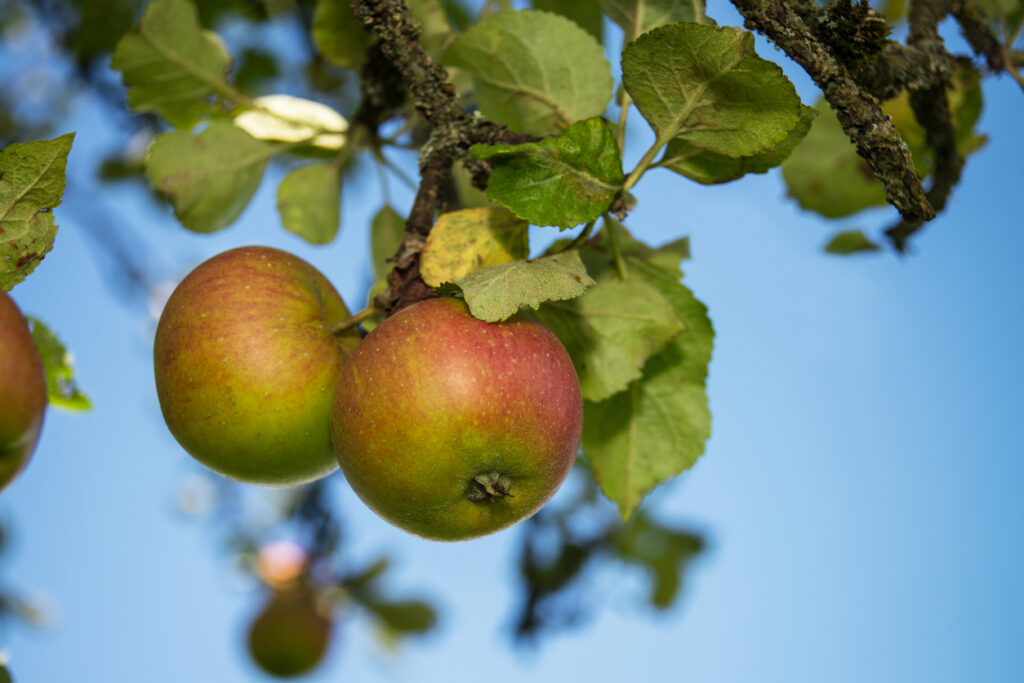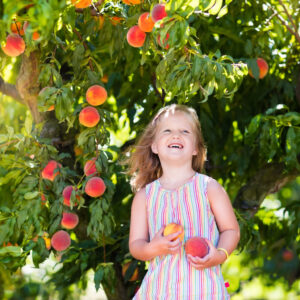It’s a nice image: You want some fresh fruit with your breakfast, so you step out into your backyard, stand under a tree, and pick a few peaches.
That’s the dream, anyway. The reality is that fruit trees, like anything you grow, require a lot of care. Here’s a few tips on how to manage that so you can enjoy the taste of fresh-grown fruit without visiting a grocery store.
Planting
We tell customers at our nursery in New Jersey that the best time to plant a fruit tree is in spring. Dormant trees can be planted as soon as the ground can be worked, although the later you plant, the slower the tree will begin to grow.
The hole where you plant the should be wide enough to fit the root system without bending or bunching too excessively, and deep enough so that the bud union is no more than two or three inches above ground once the soil settles.
Add four to six inches of soil to the hole, while gently jiggling the tree up and down to remove air pockets and help the soil cover the roots.
Give the new tree at least five gallons of water after planting to ensure a complete soaking of all the roots and soil.
Fall and winter tree care
Fruit trees will be dormant during the fall and winter, but they still require some care during this time. Here are four things you can do to care for them:
- Inspect tree after leaves have fallen completely. Check for discoloration unusual growth, cracks in the bark giving off a sticky fluid, or peeling bark. Replace any damaged or severely ill trees.
- If you have a younger tree, examine it to see where you can do some pruning. Be sure to remove branches at risk of growing into each other. On older trees, cut away dead wood along with any part of the tree showing signs of disease.
- Apply a dormant oil or fruit tree spray to destroy pests and pathogens when temperatures have stayed above freezing for a few days. Avoid insecticides if your tree has begun to bud, as these will kill bees who want to visit.
- If the forecast calls for a hard freeze, apply six inches of mulch around young, shallow-root trees.
Types of fruit trees in New Jersey
A visit to your local nursey in New Jersey will turn up several distinct kinds of fruit trees. Here are some of the most common:
Apple trees
There are 30 kinds of apple growing in New Jersey, from the very sweet Fuji and Honeycrisp to classics like Granny Smiths and McIntosh. These trees are sensitive to fungus, so keep an eye out for rusty spots on leaves.
New Jersey has been making a name for itself as a peach producer over the past few years. They produce their sweet, fuzzy fruit in the heat of summer, and look beautiful all spring. Peach trees don’t live as long as other varieties, so expect yours to provide fruit for up to 20 years.
Pear trees
These are hardy trees, able to tolerate harsh wintry weather without much maintenance.
Apricot trees
These do best with a lot of sun, and planted in soil that drains well. They wake up quickly when spring comes, and can produce between 30 and 120 pounds of fruit in the right conditions.
If you’re ready to grow fruit trees in your backyard and need to find a nursey in New Jersey, look no further than Mendham Garden Center.
We carry an extensive selection of fruit-bearing plants, such as blackberry, raspberry and blueberry, as well as apple, apricot, cherry, peach and pear trees.
Visit us today and make your dream of quick access to fresh-grown fruit a reality.


